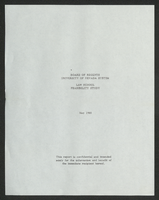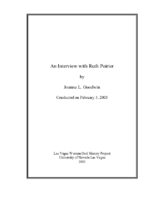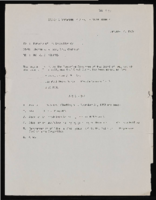Search the Special Collections and Archives Portal
Search Results

Temple Beth Sholom Master by-laws, February 12, 1998
Date
Archival Collection
Description
This document establishes the purposes and duties of the board of directors and the make up of the membership of Temple Beth Sholom.
Text

Transcript of interview with Max Goot by Charles Collins, March 22, 1976
Date
Archival Collection
Description
Interview with Max Goot by Charles Collins, March 22, 1976. In this interview, Goot talks about how he came to Las Vegas in 1945 and purchased Stoney's Jewelry, which he sold in 1951, and then bought Tinch Furniture Store. He was friends with Hank Greenspun and active in local politics and community affairs, including Temple Beth Sholom. He talks about selling the former Beth Sholom building at 13th and Carson Streets to the Greek church, and other fund raising activities. He speaks briefly about atomic tests, and the growth of the city.
Text

Transcript of interview with George Burns by Sandy Fink, April 03, 1976
Date
Archival Collection
Description
Text

Transcript of interview with Harvey Diederich by K.J. Evans, January 4, 1999
Date
Archival Collection
Description
Text

University of Nevada System Board of Regents Law School Feasibility Study
Date
Archival Collection
Description
Folder contains a Law School Feasibility Study for the Board of Regents of the University of Nevada System conducted by management consultants Cresap, McCormick and Paget Inc. From the University of Nevada, Las Vegas William S. Boyd School of Law Records (UA-00048).
Text

Transcript of interview with Ruth Poirier by Joanne Goodwin, February 5, 2003
Date
Archival Collection
Description
In 1927, a sixteen-year-old girl from Rockford, Illinois moved to New York City to play trumpet with the all-girl bands common from the 1920s through the end of World War II. During this period, which spanned Prohibition, the Great Depression, and World War II, all-girl bands came into their own in America. They were especially popular during the war, when most men were off fighting but people still needed and appreciated music. This was also a time when jazz and swing became wildly popular in this country. All-girl bands were able fill a niche left empty by men at war. Doris Eloise Pressler was born in Jamesville, Illinois on January 17, 1911 to Bertha Hendrich Pressler and Louis Pressler. Almost immediately after her birth, the Pressler family moved to Rockford, Illinois. Bertha was a teacher, a homemaker and mother. Louis did auto body hand-painting and also managed a bar. In addition, he played baritone saxophone and taught his daughter Doris to play trumpet. They both performed with hometown bands, playing churches, dances, and other social events. In 1927 at age sixteen, Doris left school, moved out of the family home, and went to work for Walgreens in downtown Rockford. In her free time she played music. Doris began her professional music career in 1927 as a trumpeter with the Gypsy Sweethearts in Rockford. That same year, she moved to New York, where she played in the only women’s band that ever performed at New York’s historic Roseland Ballroom. During the early 1930s, Doris performed with the Red Dominos, an all-girl band that was part of a variety show produced by E. K. Nadel. However, it was tough for girl musicians during the Depression. Few managers wanted to hire female players when so many men were out of work. Doris persevered, and through the 1940s, she traveled and played with other all-girl bands such as Annette Demon and her French Dolls and the Hollywood Debs. While Doris pursued her music career, a little girl in Wisconsin was learning to play the piano and trombone. Born on April 13, 1917, Ruth Poirier came from a musical family: her father John played drums and French horn, her brother drums and bassoon. John performed with the local Elks Club group, while Ruth and her brother played for their high school band. Ruth’s mother Mary had been a nurse, so when she finished high school Ruth decided to attend nursing school in Chicago. After a year, she returned home to Wisconsin and trained as a beautician. In 1939, Ruth answered a local ad for girl musicians and signed on as a trombonist with an all-girl band. Her first gig lasted only a month, the band dissolved, and she left to tour with Annette Demon and her French Dolls out of Milwaukee. While playing down South, Ruth met a fellow musician who became her lifelong companion, Doris Pressler. In July 1939, Ruth and Doris took off for Southern California. While living in Long Beach, Doris performed with bands at the 660 Club on the Pike, a well-known waterfront amusement park, and at the Waldorf Cellar. She also played a gig at Murphy’s, across from the Showboat in Las Vegas. Girl musicians began getting more jobs because the men were being called into military service. Ruth, a “Rosie the Riveter” during the war years, helped to build Navy fighter planes for Douglas Aircraft in El Segundo, California. After the war ended in 1945 women, whether “Rosie the Riveters” or band members, lost their jobs to the hordes of returning servicemen. Realizing that all-girl bands were “gonna go nowhere at all,” Doris had decided in the early 1940s to return to school and pursue studies in her second love, mathematics. She took classes in math and engineering at the University of Southern California, and then joined the Los Angeles County surveyors’ department as a civil engineer. After two years there, Doris transferred to the road department, where she worked until her retirement in 1974. Ruth returned to work as a beautician, running a shop out of her home. The Greater Los Angeles area contained an active gay and lesbian community both during and after the war. Doris and Ruth enjoyed a social life that included girls’ clubs such as Tess’s and drag clubs like the Flamingo. According to Ruth, these were “sitting-down, drinking places…and visiting. We had one club where they had dancing…. But then they let everybody in.” After the war, everybody just wanted to have fun, and Doris and Ruth enjoyed getting together with all types of friends in clubs and in private homes. During these at-home evenings, Doris and others would play popular music for everyone’s enjoyment. After their retirement to Las Vegas in 1974, Doris and Ruth were active in their local senior center. Doris played with the Las Vegas Senior Band for ten years, and Ruth worked in support of the band and the center. According to Ruth, Doris loved playing with the band, and enjoyed it more because she was retired and could devote herself to her playing. Doris Pressler and Ruth Poirier lived together through six decades of radical social change in America. From the rise of women musicians and workers outside the home, through the return of women to more “traditional” roles after World War II, and finally the revolution in women’s roles from the 1960s to the present, Doris and Ruth experienced it all. And through it all, they maintained a relationship that lasted for 62 years, until Doris’s death. According to Ruth, “I enjoyed my life. I never found anything wrong with . ... I think Doris would say the same."
Text

Economic Opportunity Board of Clark County (Nev.): memos, agendas, and meeting minutes
Date
Archival Collection
Description
From the Clark County Economic Opportunity Board Records -- Series I. Administrative. This folder contains memos, agendas and minutes from meetings of the Clark County Economic Opportunity Board from January 1970 through February 1970.
Text

Ernest Oon oral history interview: transcript
Date
Archival Collection
Description
Oral history interview with Ernest Oon conducted by Cecilia Winchell, Stefani Evans, and Jerwin Tiu on February 16, 2023 for the Reflections: the Las Vegas Asian American and Pacific Islander Oral History Project. In this interview, Oon recalls his childhood in Singapore, where his father worked on the Health and Sports Council for the Singaporean Government and his mother worked as a television assistant producer. Growing up, Oon recalls being very active, participating in everything from soccer to Tae Kwon Do. In an effort to continue his education without being being interrupted by Singapore's civil service program, Oon applied to college in the United States and ended up attending California State University. Although he was on the medicine track in Singapore, he switched to finance. After a series of jobs within credit banking, he is now a chief credit officer for Bank of Nevada. Throughout the interview, Oon reflects on the changes in his life living in different places, the street food from Singapore, and his unique tennis game.
Text

Maila Aganon oral history interview: transcript
Date
Archival Collection
Description
Oral history interview with Maila Aganon conducted by Kristel Peralta, Cecilia Winchell, and Stefani Evans on June 10, 2021 for Reflections: The Las Vegas Asian American and Pacific Islander Oral History Project. Maila Aganon discusses her childhood, family upbringing, and immigration to the United States from the Philippines when she was a college student. She shares how her parents moved to Las Vegas first and Maila followed a decade later, investing in real estate and eventually taking up permanent residence. Maila talks about her employment history with Allstate Insurance, Bank of America, AAA, Caesars Entertainment, and finally Aon as a Senior Vice President. She also shares her thoughts on the growth of Las Vegas and the growth of the Asian community and cultural influence within the city. Subjects discussed include: anti-Asian violence; Filipino grocery stores; Filipino foods; remote work.
Text

Lisa Song Sutton oral history interview: transcript
Date
Archival Collection
Description
Oral history interview with Lisa Song Sutton conducted by Cecilia Winchell, Vanessa Concepcion, and Stefani Evans on November 19, 2021 for Reflections: The Las Vegas Asian American and Pacific Islander Oral History Project. Lisa shares her personal history and childhood memories moving from Seoul, South Korea to Sierra Vista, Arizona at the age of five. She discusses her educational and professional pursuits in business litigation, bankruptcy law, entrepreneurship, modeling, and her time in the pageant circuit winning Miss Vegas and Miss Nevada in 2013. Lisa also talks about her activism and community engagement efforts to empower women within Las Vegas. She concludes her interview with insight into her Korean heritage, traditional celebrations, and religion.
Text
